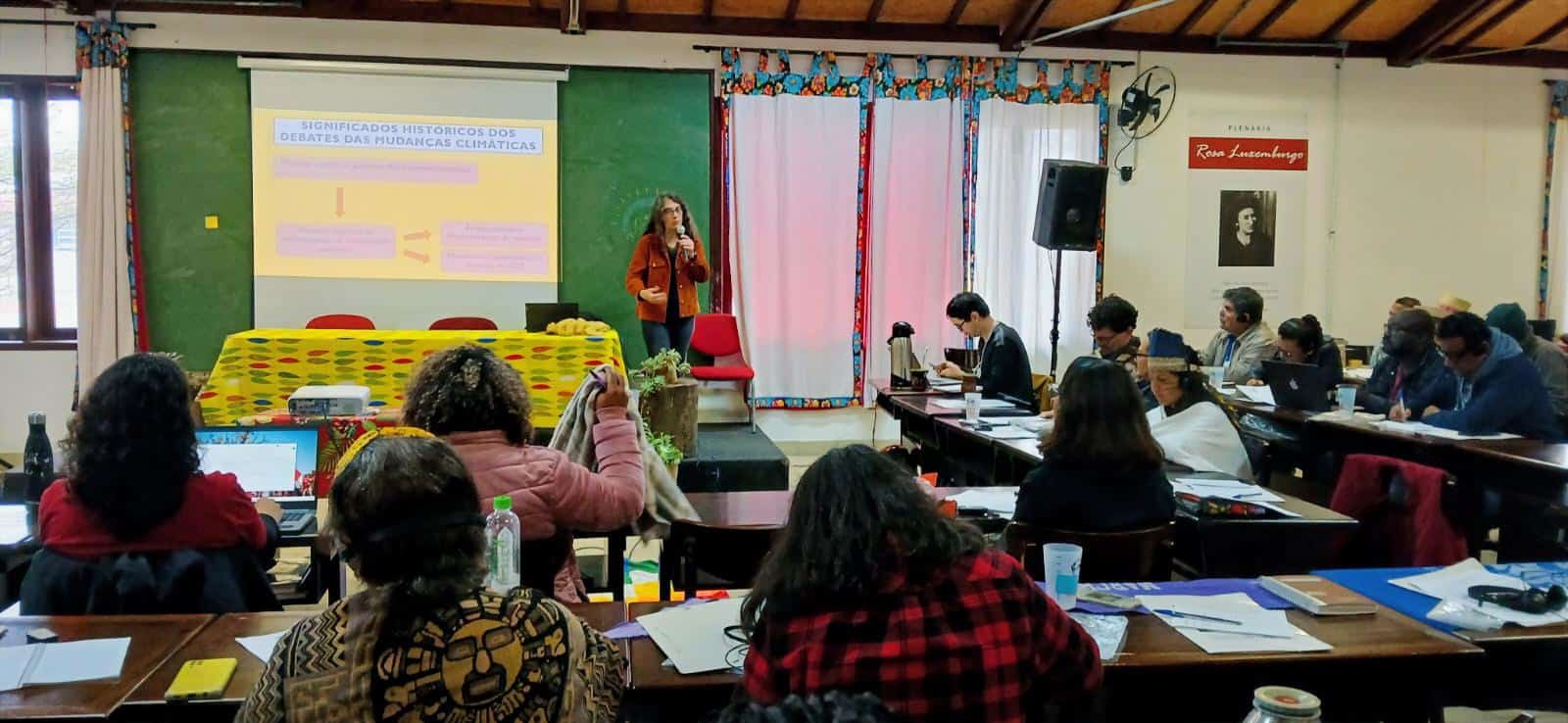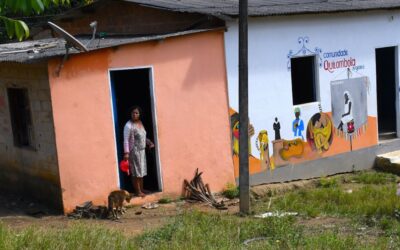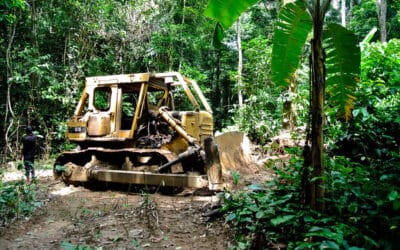Notes from the Meeting on Nature Markets in Guarema, Brazil
By Valentina Figuera Martínez and Andrea Echeverri, Global Forest Coalition
8/8/2025
Letícia Tura, the executive director of the Brazilian non-profit organization FASE, speaks with lucidity and nuance about false solutions to climate change. Before taking the podium at the Rosa Luxemburg Auditorium at the Florestán Fernándes School of the Brazilian Landless Workers Movement (MST), she listens attentively to colleagues from more than 40 organizations across Latin America and the Caribbean. She takes notes in a small notebook with a picture of a jaguar on the front, its menacing eyes a reminder of the power of the jungle.
With a critical take on today’s socio-environmental crisis, Letícia addresses the issue of false solutions in official climate change negotiations and provides a frank assessment of the structural causes of biodiversity loss, deforestation, and forest degradation.
Tura’s talk was part of the Meeting on Nature Markets, organized by GRAIN and the Coordinadora Latinoamericana de Organizaciones del Campo (CLOC)/Vía Campesina, with social movements and organizations from around 20 countries across Latin America and the Caribbean. It was held in Guararema, not far from the Brazilian capital city, from July 21 to 24, 2025.
Ahead of the upcoming Climate Change Conference (COP 30) and People’s Summit in Belém this November, it was a valuable opportunity to build common understandings about the impacts of projects aimed at the financialization of nature, which destroy thousands of acres of tropical forests and communities across the region.
Participants included civil society groups FASE of Brazil (Federação de Órgãos para Assistência Social e Educacional) and Centro de Estudios Heñói of Paraguay, both of which are members of the Global Forest Coalition, a network for rights-based forest protection that turns 25 this year. At the meeting, they offered critiques of mechanisms like REDD+, the Tropical Forest Forever Facility (TFFF), biodiversity markets, and carbon markets, the latter of which includes what’s known as carbon farming. GFC members and campaigners spoke up to expand on the critical assessment of schemes for the financialization of nature and defined strategies for territorial defense throughout the region.
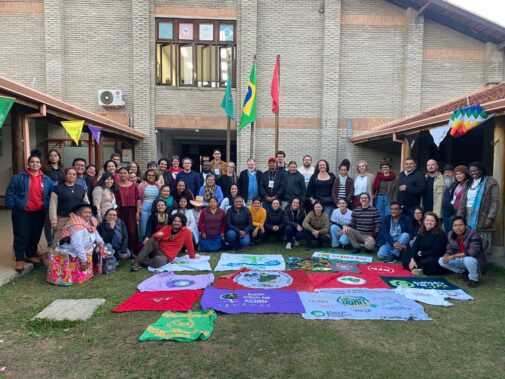
Organizations and social movement representatives at the opening session of the Meeting on Nature Markets. Photo: Andrey Martínez, CLOC/La Vía Campesina.
“The climate change debate isn’t just technical; it’s also political: it has to do with the class struggle, gender injustices, and disputes over the development model. The logic behind the debate can’t just be about emissions reductions and market ‘solutions.’ This debate is political, it’s about the type of society we want to build, and it’s in conflict with the business sector that tries to impose its vision of the world on us,” Tura said.
The region of Latin America and the Caribbean has the highest concentration of carbon market projects in the world, partly due to the region’s rich ecosystems, such as the Amazon, the Gran Chaco, and the Mata Atlántica (Brazil’s Atlantic Forest), biomes that are coveted by those seeking to implement false climate solutions. Such projects typically involve greenwashing, fraud, land grabbing, rights violations, and deforestation; however, they are frequently the focus of negotiations on climate and biodiversity finance.
In 2024, in the Brazilian Amazon alone, more than half of the carbon credit projects—which occupy a total of 78,000 square miles—overlapped public lands. Among the companies that bought these carbon credits to compensate for their greenhouse gas emissions are Netflix, Air France, Delta Air Lines, Airbnb, Takeda Pharmaceutical Co., Spotify, and Boeing.
In addition to rigorous critiques of the most well-known false climate solutions in the region, the meeting also raised the alarm about other carbon credit schemes associated with monoculture tree plantations and so-called carbon farming. According to a report by GRAIN, carbon markets based on afforestation and reforestation have gobbled up 9 million hectares across the Global South, and have given a boost to the territorial expansion of commercial reforestation companies, whose impacts have been widely denounced.
Carbon farming is based on the false premise that carbon can be accumulated in soils through agricultural practices such as zero tillage (no plowing) or pasture rotation and new varieties with deep roots, which are linked to industrial livestock farming. Corporations like the meat giant Minerva, which, through its Renove program, promotes “carbon neutral meat” and also sells credits, have been denounced for their ties to deforestation and land grabbing in the Brazilian Amazon.
A case study of Hacienda San José in Colombia published by GFC demonstrated the repercussions for the Indigenous Sikuani community—and particularly women—of a project that is in the process of obtaining carbon credits and aims to produce 450,000 cattle in a way that is certified “carbon negative.”
The reality is changing, and organizations and social movements are adapting their strategies for the defense and care of the territories and communities.
“These days, we see that the debate isn’t just about carbon markets in a strict sense,” Tura said. “Rather, there are different forms of appropriation of forests and nature’s common goods, such as the datafication of agriculture and the digitalization of territories. However, we see powerful new forms of resistance. Women play a key role; they’re on the front lines of resistance. We’ve heard some upsetting stories at the meeting, but also tales of resistance in the face of market-based projects and reproduction of the communitarian societies that we want to build. Agroecology, the management of nature’s common goods, community funds, saving and exchanging seeds—these are some of the forms of living resistance in our region.”
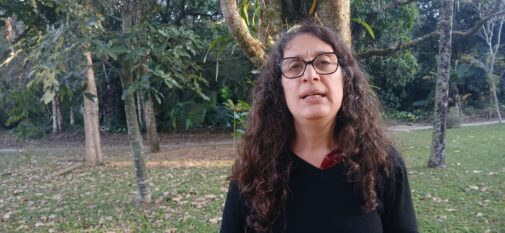
Letícia Tura of FASE at the Meeting on Nature and Markets in Guararema, Brazil. Photo: Valentina Figuera Martínez.
Omar Yampey, the executive director of Centro de Estudios Heñói, leads struggles against big agribusiness and monocultures in Paraguay. A careful and eloquent speaker, he is an expert on the forestry business that has caused social and environmental harm in that country at the hands of companies like Forestal San Pedro and Forestal Apepu, which together control over 17,000 hectares of monoculture eucalyptus plantations in Paraguay. They are both part of Fondo Arbaro, a Green Climate Fund program.
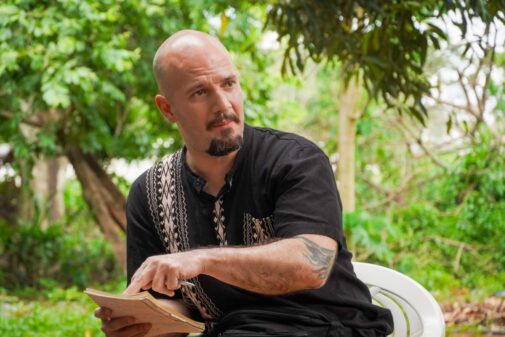
Omar Yampey of Centro de Estudios Heñói. Photo: Mombú Audiovisual.
“False solutions contain elements of classical forms of extractivism and agribusiness. The Paraguayan government has a policy of widespread exploitation of eucalyptus monocultures. In northern Paraguay, the indigenous communities are asking for our help to understand the murky proposals on carbon markets. It’s not a moral issue in the sense of judging communities that do accept carbon markets, but rather, it’s a political issue. We have to position ourselves in response to this scenario,” Omar said.
When the Global North justifies its destruction, the perpetrators won’t be able to claim that the peoples of the South stayed silent. They won’t think we went down without a fight. We’re speaking out, resisting, and enduring, with our real solutions. Let’s keep it that way.
Translated from the Spanish by Megan Morrissey.
Apuntes del Encuentro sobre Mercados de la Naturaleza en Guararema
Por Valentina Figuera Martínez y Andrea Echeverri, Coalición Mundial por los Bosques (GFC)
8/8/2025
Letícia Tura, directora ejecutiva de FASE, habla de falsas soluciones climáticas con lucidez ramificada. Antes de pasar al podio del auditorio Rosa Luxemburgo de la Escuela Florestán Fernándes del Movimiento Sin Tierra (MST) de Brasil, escucha atentamente a compañeras y compañeros de más de 40 organizaciones de América Latina y el Caribe. Toma notas en una pequeña libreta con una foto de un jaguar que, con su mirada profunda, pareciera increparnos sobre los devoradores de memoria.
Con una mirada crítica de la crisis socioecológica, Letícia habla sobre las falsas soluciones en las negociaciones climáticas y posiciona un discurso frontal en contra de las raíces estructurales de la pérdida de biodiversidad y ecosistemas forestales.
El Encuentro sobre Mercados de la Naturaleza, organizado por GRAIN y la Coordinadora Latinoamericana de Organizaciones del Campo (CLOC)/Vía Campesina, reunió a movimientos sociales y organizaciones de casi 20 países latinoamericanos y caribeños, del 21 al 24 de julio en Guararema, estado de Sao Paulo, Brasil. Fue una oportunidad valiosa para construir entendidos comunes (particularmente con miras a la COP 30 del CMNUCC y la Cumbre de los Pueblos) ante los impactos de proyectos de financiarización de la naturaleza, que destruyen cientos de hectáreas de bosques, selvas y comunidades en la región.
En este encuentro, organizaciones de la sociedad civil, incluyendo FASE de Brasil y el Centro de Estudios Heñói de Paraguay, ambas miembros de la Coalición Mundial por los Bosques (GFC), plantearon críticas sobre mecanismos como REDD+, el Tropical Forest Forever Facility o TFFF, así como las compensaciones y créditos de biodiversidad y carbono, estas últimas que incluyen la agricultura de carbono o carbon farming. Como coalición ampliamos el diagnóstico crítico sobre el estado de los esquemas de financiarización de la naturaleza en la región y afinamos estrategias de defensa territorial.

Organizaciones y movimientos sociales en el acto de apertura. Foto: Andrey Martínez, CLOC/La Vía Campesina
“El debate del cambio climático no es técnico, sino político: tiene que ver con la lucha de clase, las injusticias de género y la disputa del modelo de desarrollo. No puede ser que la lógica que domine el debate sea solo la reducción de emisiones y soluciones del mercado. La disputa es política y tiene que ver con el tipo de sociedad que queremos construir y la afronta al sector empresarial que nos impone una visión de mundo,” sentenció Leticia en su presentación.
América Latina y el Caribe es una de las regiones del mundo con mayor concentración de proyectos de mercados de carbono, en parte, debido a la riqueza de ecosistemas esenciales, incluyendo la Amazonía, el Gran Chaco y la Mata Atlántica, biomas altamente codiciados para la implementación de falsas soluciones lucrativas. Estos proyectos terminan en prácticas de lavado verde, fraude, acaparamiento de tierras, violación de derechos y deforestación, sin embargo, dominan la atención en las negociaciones de financiamiento climático y de biodiversidad.
En 2024, solo en la Amazonía brasileña, más de la mitad de los proyectos de créditos de carbono, que en total cubrían más de 20 millones de hectáreas, se solaparon con tierras públicas. Empresas como Netflix, Air France, Delta Air Lines, Airbnb, Takeda Pharmaceutical Co., Spotify y Boeing compraron estos créditos para compensar sus emisiones.
Además de críticas densas en contra de las falsas soluciones climáticas más conocidas por sus impactos en la región, durante el encuentro se alertó sobre otros esquemas de créditos de carbono asociados a monocultivos de árboles y a la llamada agricultura de carbono. Según una investigación de GRAIN, los mercados de carbono de Aforestación y Reforestación (AR) abarcan 9 millones de hectáreas en el Sur Global, y se han constituido en un espaldarazo para la ampliación territorial de reforestadoras comerciales, cuyos impactos han sido ampliamente denunciados.
La agricultura de carbono parte de la errónea premisa de acumulación de carbono en suelos a través de prácticas agropecuarias como cero labranza (no arado) o rotación de pasturas y nuevas variedades con raíces profundas, relacionadas a la ganadería industrial. Casos como el del gigante cárnico Minerva, que a través de su programa Renove promueve “carne carbono neutral” y además comercializa créditos, han sido denunciados por sus vínculos con la deforestación y el acaparamiento de tierras en la Amazonía brasileña.
En Colombia, el caso de la Hacienda San José, publicado por la GFC, mostró repercusiones a la comunidad indígena Sikuani, especialmente a las mujeres, por un proyecto en proceso de obtención de créditos de carbono que aspira en su punto máximo criar 450.000 reses, ahora “carbono negativas”.
La realidad está cambiando y las organizaciones y movimientos sociales ajustan las estrategias de defensa y cuidado. “Actualmente vemos que el debate no es solo sobre mercados de carbono stricto sensu, sino que hay diferentes formas de apropiación de los bosques y bienes comunes de la naturaleza, como la datificación de la agricultura y digitalización de los territorios”, destacó Leticia.
“Sin embargo, vemos formas de resistencias potentes. Las mujeres tienen un papel destacado, están en la primera línea de las resistencias. Oímos relatos fuertes en el encuentro, pero también se expusieron las resistencias para impedir el avance de proyectos de mercado y lograr la reproducción de las sociedades comunitarias que queremos construir. La agroecología, la gestión de los bienes comunes de la naturaleza, los fondos comunitarios, el intercambio y la preservación de semillas son algunas de las resistencias vivas en nuestra región”.

Letícia Tura, directora ejecutiva de FASE, durante el Encuentro de Mercados sobre la Naturaleza, en Guararema, Brasil. Foto: Valentina Figuera Martínez.
Omar Yampey, director ejecutivo del Centro de Estudios Heñói, lidera acciones de lucha contra el agronegocio y los monocultivos en Paraguay. De hablar pausado y cautelosa elocuencia, es un experto en el negocio forestal que ha causado estragos socioambientales en ese país, a manos de empresas como Forestal San Pedro y Forestal Apepu –ambas pertenecientes a la cartera del Fondo Arbaro–, que juntas controlan más de 17 mil hectáreas de monocultivos de eucaliptos en ese país (el Fondo Arbaro es un programa del Fondo Verde para el Clima).

Omar Yampey, director ejecutivo del Centro de Estudios Heñói. Foto: Mombú Audiovisual.
“Las falsas soluciones tienen elementos de las formas clásicas del extractivismo y el agronegocio. El gobierno paraguayo tiene toda una política de explotación extensiva de monocultivos de eucalipto. En la zona norte de Paraguay las comunidades indígenas nos piden ayuda para decodificar esta propuesta del mercado de carbono que se instala como algo poco claro. Este encuentro nos permite ir con más claridad al territorio. No es una cuestión moral en el sentido de juzgar a las comunidades que accedan al mercado de carbono, sino una cuestión política. Tenemos que situarnos a partir de ese escenario”, planteó Omar.
Cuando el Norte Global justifique la destrucción ambiental, que no digan que los territorios del Sur guardaron silencio. Que no imaginen que desaparecimos sin hablar. Hablamos, resistimos y perduramos con nuestras soluciones reales. Que eso quede. [:fr]
Notes prises lors de la rencontre sur les marchés de la nature à Guararema
Par Valentina Figuera Martínez et Andrea Echeverri, Coalition mondiale pour les forêts (GFC)
8/8/2025
Letícia Tura, directrice exécutive de FASE, parle des fausses solutions climatiques avec une lucidité ramifiée. Avant de monter à la tribune de l’auditorium Rosa Luxemburg de l’École Florestán Fernándes du Mouvement des sans-terre (MST) du Brésil, elle écoute attentivement ses camarades de plus de 40 organisations d’Amérique latine et des Caraïbes. Elle prend des notes dans un petit carnet orné d’une photo d’un jaguar qui, du regard profond, semble nous interpeller sur ceux qui dévorent la mémoire.
Avec un regard critique sur la crise socio-écologique, Letícia parle des fausses solutions dans les négociations climatiques et tient un discours frontal contre les racines structurelles de la perte de biodiversité et des écosystèmes forestiers.
Continuer en anglais…
Tura’s talk was part of the Meeting on Nature Markets, organized by GRAIN and the Coordinadora Latinoamericana de Organizaciones del Campo (CLOC)/Vía Campesina, with social movements and organizations from around 20 countries across Latin America and the Caribbean. It was held in Guararema, not far from the Brazilian capital city, from July 21 to 24, 2025.
Ahead of the upcoming Climate Change Conference (COP 30) and People’s Summit in Belém this November, it was a valuable opportunity to build common understandings about the impacts of projects aimed at the financialization of nature, which destroy thousands of acres of tropical forests and communities across the region.
Participants included civil society groups FASE of Brazil (Federação de Órgãos para Assistência Social e Educacional) and Centro de Estudios Heñói of Paraguay, both of which are members of the Global Forest Coalition, a network for rights-based forest protection that turns 25 this year. At the meeting, they offered critiques of mechanisms like REDD+, the Tropical Forest Forever Facility (TFFF), biodiversity markets, and carbon markets, the latter of which includes what’s known as carbon farming. GFC members and campaigners spoke up to expand on the critical assessment of schemes for the financialization of nature and defined strategies for territorial defense throughout the region.

Organizations and social movement representatives at the opening session of the Meeting on Nature Markets. Photo: Andrey Martínez, CLOC/La Vía Campesina.
“The climate change debate isn’t just technical; it’s also political: it has to do with the class struggle, gender injustices, and disputes over the development model. The logic behind the debate can’t just be about emissions reductions and market ‘solutions.’ This debate is political, it’s about the type of society we want to build, and it’s in conflict with the business sector that tries to impose its vision of the world on us,” Tura said.
The region of Latin America and the Caribbean has the highest concentration of carbon market projects in the world, partly due to the region’s rich ecosystems, such as the Amazon, the Gran Chaco, and the Mata Atlántica (Brazil’s Atlantic Forest), biomes that are coveted by those seeking to implement false climate solutions. Such projects typically involve greenwashing, fraud, land grabbing, rights violations, and deforestation; however, they are frequently the focus of negotiations on climate and biodiversity finance.
In 2024, in the Brazilian Amazon alone, more than half of the carbon credit projects—which occupy a total of 78,000 square miles—overlapped public lands. Among the companies that bought these carbon credits to compensate for their greenhouse gas emissions are Netflix, Air France, Delta Air Lines, Airbnb, Takeda Pharmaceutical Co., Spotify, and Boeing.
In addition to rigorous critiques of the most well-known false climate solutions in the region, the meeting also raised the alarm about other carbon credit schemes associated with monoculture tree plantations and so-called carbon farming. According to a report by GRAIN, carbon markets based on afforestation and reforestation have gobbled up 9 million hectares across the Global South, and have given a boost to the territorial expansion of commercial reforestation companies, whose impacts have been widely denounced.
Carbon farming is based on the false premise that carbon can be accumulated in soils through agricultural practices such as zero tillage (no plowing) or pasture rotation and new varieties with deep roots, which are linked to industrial livestock farming. Corporations like the meat giant Minerva, which, through its Renove program, promotes “carbon neutral meat” and also sells credits, have been denounced for their ties to deforestation and land grabbing in the Brazilian Amazon.
A case study of Hacienda San José in Colombia published by GFC demonstrated the repercussions for the Indigenous Sikuani community—and particularly women—of a project that is in the process of obtaining carbon credits and aims to produce 450,000 cattle in a way that is certified “carbon negative.”
The reality is changing, and organizations and social movements are adapting their strategies for the defense and care of the territories and communities.
“These days, we see that the debate isn’t just about carbon markets in a strict sense,” Tura said. “Rather, there are different forms of appropriation of forests and nature’s common goods, such as the datafication of agriculture and the digitalization of territories. However, we see powerful new forms of resistance. Women play a key role; they’re on the front lines of resistance. We’ve heard some upsetting stories at the meeting, but also tales of resistance in the face of market-based projects and reproduction of the communitarian societies that we want to build. Agroecology, the management of nature’s common goods, community funds, saving and exchanging seeds—these are some of the forms of living resistance in our region.”

Letícia Tura of FASE at the Meeting on Nature and Markets in Guararema, Brazil. Photo: Valentina Figuera Martínez.
Omar Yampey, the executive director of Centro de Estudios Heñói, leads struggles against big agribusiness and monocultures in Paraguay. A careful and eloquent speaker, he is an expert on the forestry business that has caused social and environmental harm in that country at the hands of companies like Forestal San Pedro and Forestal Apepu, which together control over 17,000 hectares of monoculture eucalyptus plantations in Paraguay. They are both part of Fondo Arbaro, a Green Climate Fund program.

Omar Yampey of Centro de Estudios Heñói. Photo: Mombú Audiovisual.
“False solutions contain elements of classical forms of extractivism and agribusiness. The Paraguayan government has a policy of widespread exploitation of eucalyptus monocultures. In northern Paraguay, the indigenous communities are asking for our help to understand the murky proposals on carbon markets. It’s not a moral issue in the sense of judging communities that do accept carbon markets, but rather, it’s a political issue. We have to position ourselves in response to this scenario,” Omar said.
When the Global North justifies its destruction, the perpetrators won’t be able to claim that the peoples of the South stayed silent. They won’t think we went down without a fight. We’re speaking out, resisting, and enduring, with our real solutions. Let’s keep it that way.
Translated from the Spanish by Megan Morrissey.[:]

